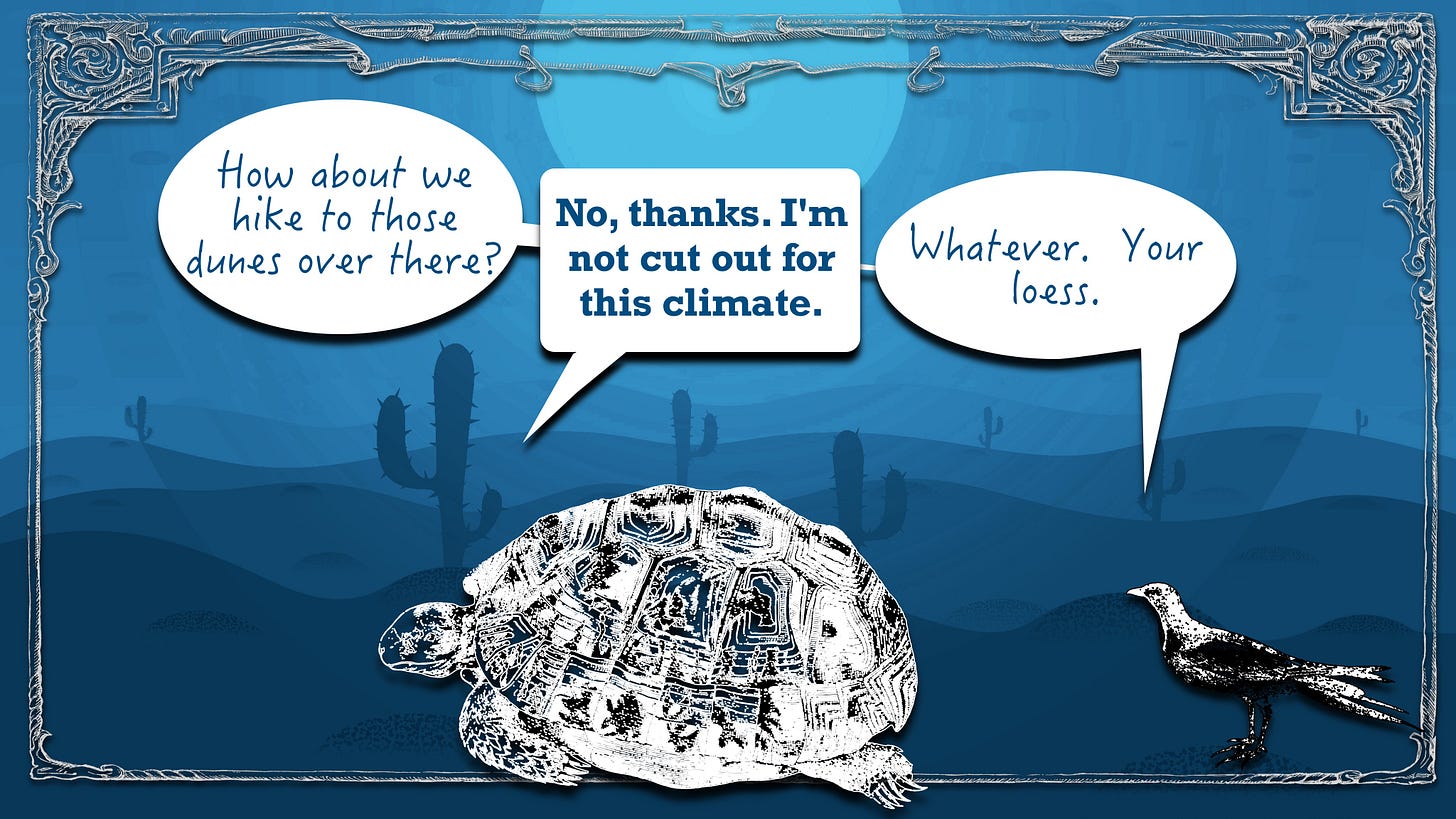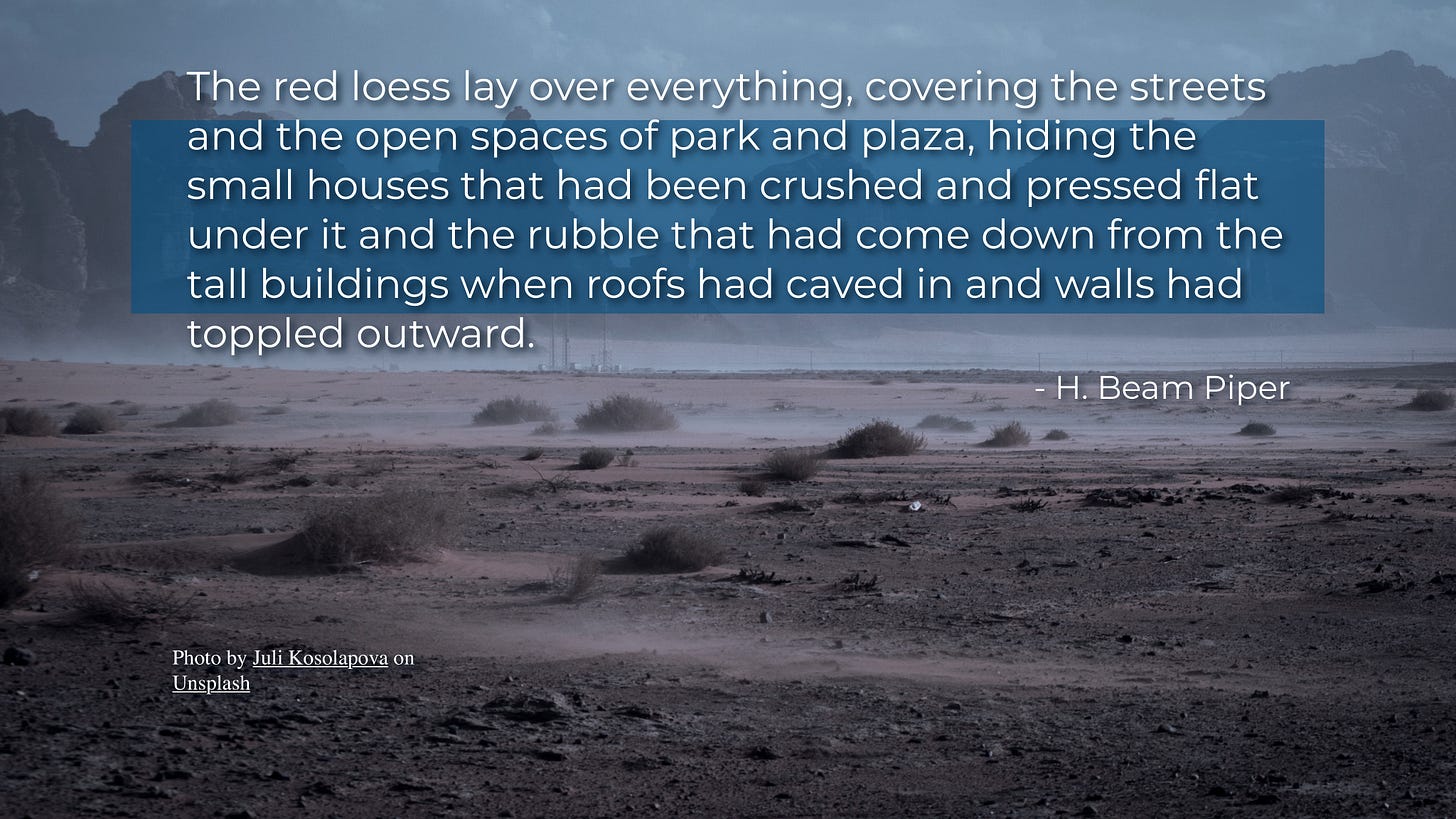More or Loess
Learned Volume 5, Issue 45
This week: Mars, baby! Or, at least, the dirt on the red planet. What do you call it? We’ll find out. Read on!
Regolith
Quick, what's your favorite novel about Mars and what does it call Martian dirt? For reasons I’m not fully able to explain, I became a little obsessed with this question (Martian dirt) over past few days and it started with a chance re-reading of a favorite story, H. Beam Piper’s Omnilingual1.
For anyone unfamiliar, Omnilingual is a 1957 science-fiction story set in the near future, an archeological team pore through the remnants of a Martian civilization which died centuries before modern man emerged on Terra. The team makes discovery after discovery, including a wealth of written material, but they lament that they will never be able to truly understand it due to the lack of a Rosetta Stone. And then one member of the team discovers a Martian copy of the periodic table of elements and realizes that she does, indeed, have a universal Rosetta Stone for any and all advanced civilizations.
As a modern reader, the story is not without its problems, but it was formative for me, reading it out of a dusty paperback collection of Piper's stories over summer break; the idea that mathematics could form the basis for a universal language was simply mind-blowing to the young teen that I was. It is well worth reading, if only for a glimpse of the retro-future it imagined.
Piper opens the story by describing the alien ruins:
The red loess lay over everything, covering the streets and the open spaces of park and plaza, hiding the small houses that had been crushed and pressed flat under it and the rubble that had come down from the tall buildings when roofs had caved in and walls had toppled outward.
Stark, compelling, evocative. Just a good way to start a story. Really grabs the reader. But, let’s talk about that third word in, loess. According to our good friends at Merriam-Webster, it can be pronounced as either “less” or “loss” and means:
an unstratified usually buff to yellowish brown loamy deposit found in North America, Europe, and Asia and believed to be chiefly deposited by the wind
Which makes it interesting that Piper would use loess to describe Martian dirt. By contrast, here’s how Wikipedia describes Martian soil:
Martian soil is the fine regolith (a blanket of unconsolidated, loose, heterogeneous superficial deposits covering solid rock) found on the surface of Mars.
Now, in fairness to Piper, we’ve learned a hell of a lot about Martial dirt and its composition in the decades since Piper wrote Omnilingual. We've learned a lot of other facts about Mars, too. Like that there are no canals there, at least not ones made by anything other than wind and water. But, like Bradbury2 before him, Piper chose to ignore that fact and wrote with both eyes stuck fast behind rose-tinted glasses to imagine a more Romantic (note the capital) version of the future.
Which makes me wonder why he chose loess. Surely it can’t have been for lack of better, more commonly understood or used phrases? I started wondering3 if any of my other favorite books set on Mars had used the word loess to describe, well, anything. So, off I went to Google Books and…here’s a short list4 of all the books that do not mention loess at all:
The Martian
Red Mars
Green Mars
The Martian Chronicles
Podkayne of Mars
Stranger in a Strange Land
A Princess of Mars
Marsbound
Spin
Mars Life
Saturn's Children
So what words do these books use? Dirt, mainly. A few mentions of regolith here and there, but mainly dirt. But I was yet undeterred and broadened my search to books I haven’t actually read yet, which is where I hit, ahem, paydirt:
The sand drifts must have been made of loess, made of loose light aeolian deposits.
That little passage comes from Kim Stanley Robinson’s Blue Mars5, a book that takes place on Mars after it has been fully terraformed and made into a second Earth. Cue the Alanis Morissette6.

Of all the things that don’t matter in life, the question of why H. Beam Piper chose this one particular word to describe the dirt on Mars when no other authors did is pretty near the top of the list. And yet.
I did a little more digging7.
In the NOW corpus, loess has a decent ranking. However, within the first 100 listings, ordered by most recent and going backward, the vast majority of the uses are as a proper noun, the Loess Plateau of northern China. By contrast, when loess is used as a common noun, it seems to always be accompanied by an explanatory aside because readers just aren’t that familiar with the term.
In fact, going through Google’s Ngram viewer, loess appears to have peaked in popularity in the 1960s, suggesting that readers in 1957 might have been more attuned to the word, much like sci-fi readers today tend to know what regolith is.
But who knows? Piper, unfortunately, did not live many years past the publication of the story and so is unavailable to explain his choices. But I can at least appreciate that this one small detail at the beginning of a short tale about math and language and alien cultures, set me off on a trail of discovery and research, much like an explorer crossing the Martian regolith in his rover.
Announcement
As I mentioned last week and the week before, I'm planning on presenting a short workshop during this year's LingFest. I'm still working on getting the page set-up; please be patient. We’re listed on the schedule and everything!
In the meantime though, here's a little bit of what you can expect:
Let's hold two ideas out for a second. The first is that journaling is a good thing. The second is that there are over a dozen ways, in English, to coin new words. This workshop aims to use the second idea to help us with the first idea. In other words, we're going to make up a bunch of new words and then learn how we can use them in journaling and creative exercises.
The workshop will be held on Zoom and attendance is free! I'll update the page as soon as I have more information about the schedule, etc.
Down the Rabbit Hole
Omnilingual has become an excellent example of retro-futurism, a vision of the future that is incredibly dated to anyone reading it in modern times. In Piper's story, data is stored on tape and microfiche, phone calls are specified to be wireless, and technology is heavily centered around physics-derived solutions rather than chemical or biological. Computers are big and bulky and require massive amounts of power.
On the reverse of that, culturally, the future looks a lot like middle-America circa 1955 - the scientists and archeologists stop their work for cigarettes and cocktails, while men and women do work together and women do substantial jobs, they are still condescended to and considered frail and prone to emotional outbursts. In other words, it's the future as seen from the past.
Like all things genre-related, the core ideas of retro-futurism have been distilled into a dozen different subgenres, tropes, and memes. And there is no better repository of these disparate pieces of media than the glorious last holdout of Web 2.0 that is Tumblr and its retro-future tags. Tread lightly.
From the Archives
Since this is a book heavy issue this week, let me link back to another time I talked about books and reading, specifically, December 2020, when I talked about what I consider when I consider good reads. Enjoy!
Full story available at Project Gutenberg. It’ll take about ten minutes to read the whole thing. It’s worth it, I promise.
The Martian Chronicles is perhaps my favorite Mars book that isn’t really about Mars at all.
As I said, a little obsessed.
I highly recommend this list, by the way. All good books.
Which is actually the sequel to Red Mars and Green Mars from my original list. I just haven’t managed to finish Green Mars yet. That’s not a slam on the book at all, I just…my ability to read weighty hard-science tomes seems to have been a victim of the pandemic. It’s not a concentration problem as much as it is a tiredness that makes it too hard to get into them. Although I’m still reading a lot, it’s all light, escapist stuff.
For younger readers, Alanis Morissette is a singer who released a song called “Ironic” in the 1990s which contained several examples of the word ironic being used incorrectly. Which is, in itself, ironic.
Obsession!



